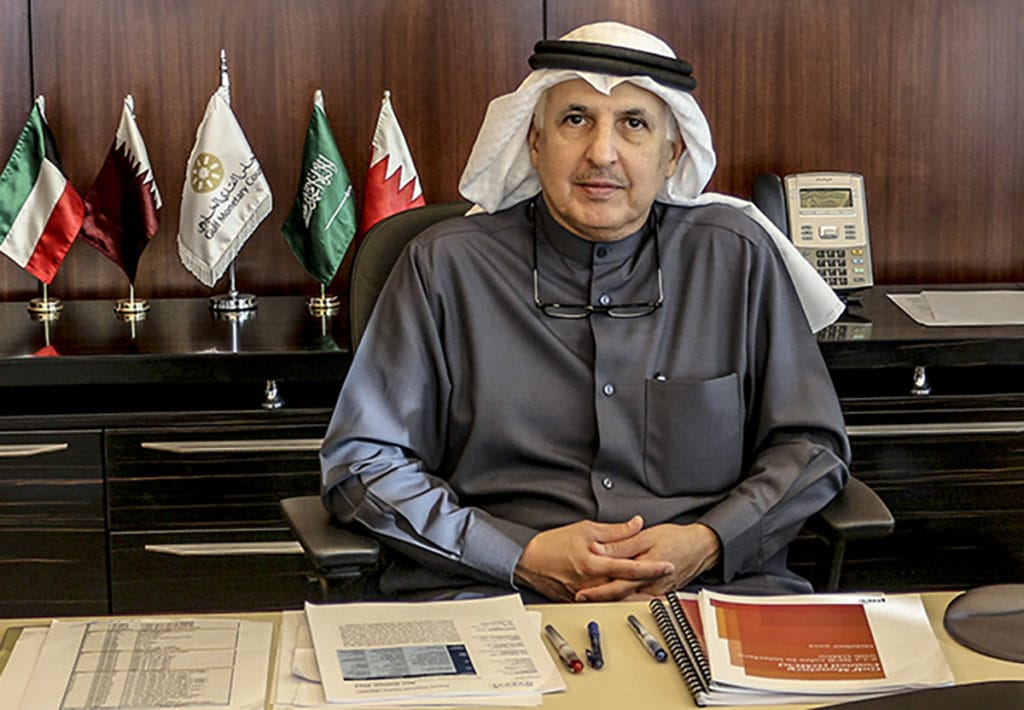Carrying the Flame: Dr. Khalid Al-Saad

Bridging the Gulf
Having crafted national policy as Kuwait’s deputy minister for higher education, and having spent six years as an executive director with the World Bank, His Excellency Dr. Khalid Al-Saad is quite accustomed to formidable professional challenges; more so considering he also served as the dean and secretary general of the 30,000-plus student campus of Kuwait University.
But the CGU alumnus (MBA, 1979; PhD, Management, 1986) has recently taken on what may prove to be his most challenging responsibility yet: forging a common currency for four of the Gulf Cooperation Council’s (GCC) leading national economies.
“With a common currency we will have a stronger voice in the world economy and world trade,” Al-Saad explains.
The venture, which promises profound international benefits, is groundbreaking. Bahrain, Kuwait, Qatar, and Saudi Arabia each has its own currency, its own central bank, and its own complex fiscal networks. Drawing these sovereign nations into a new, shared economic system—the Gulf Monetary Council—seems daunting enough. However, the project became all the more challenging for Al-Saad, a graduate of the Peter F. Drucker & Masatoshi Ito Graduate School of Management, when he was selected to head the effort from its inception. “I became the first employee of the Gulf Monetary Council one year ago when I was chosen to be its chief executive. Now I find myself building an entire institution from scratch.”
For now, the monetary union includes four of the six countries already linked politically in the GCC. The United Arab Emirates and Oman have opted to stay on the sidelines, but Al-Saad seems confident they will join in the future. After all, the Gulf Monetary Council already has the involvement of the head of each participating country’s central bank. The council’s governing board meets regularly to set policies, establish internal controls, guide its developing IT framework, and set guidelines for basic but essential things as staffing and salary scales.
In his role as chief executive, Al-Saad has been tasked with getting the Saudi Arabia-based institution off the ground literally as well as figuratively. “Right now we are renting two floors of a building in Riyadh while we construct our own center. The new building will be part of a complex called the King Abdullah Financial Center. Public and private financial institutions will be located there, along with the Gulf Monetary Council.”
With oil prices near record highs and with the GCC countries experiencing high rates of growth, why form such a monetary union? “For the benefit of our citizens,” Al-Saad explains. “You can fly from Riyadh to Kuwait in 50 minutes, and from there to Bahrain it’s also 50 minutes. It’s like flying from San Francisco to LA. These countries share the same culture, and in many ways have more in common than the European countries in the European Union (EU).”
Al-Saad cites a host of other pragmatic benefits, including some that will speak to any traveler dealing with varying currencies in the region. “If I take 10,000 Kuwaiti dinar and change them to Saudi riyal, then exchange them to Qatari riyal, then go to Bahrain and change those to Bahraini dinar then come back to Kuwait and exchange them again, I will no longer have 10,000 Kuwaiti dinar.”
A common currency “will also help trade and investment among member countries.”
“Though each country will retain its sovereignty, monetary union will make it easier for individuals in this region to travel, to work, to purchase property and to invest,” Al-Saad says.
Despite recent setbacks in the EU, Al-Saad believes the moment is right for the countries participating in the Gulf Monetary Council to draw closer together. His ability to seize this opportunity grows from skills he first honed at Claremont Graduate University. “At Claremont, I took two classes from Peter Drucker. He opened my eyes to many things, including that people sometimes have the wrong impression regarding management. He was a teacher but also a philosopher. When I think back to that time, I have realized that he was right in terms of many things we do in management.”
“Being in Claremont was one of the best times in my life: the environment, the quality of learning, the opportunity CGU provided to learn across wide areas. The experience was fantastic.” Fantastic, but not easy. “The competition with other students could be very intense. Sometimes I would be up all night finishing my homework before a deadline. But it was an excellent experience that developed my abilities and contributed to my career.”
When asked what observations from his own career he might share with graduate students today, Al-Saad does not hesitate. “The first thing I would tell them is you need to see outside your own country. Go see other cultures, learn from other cultures, learn to do business in other countries. This is very important. Despite the fact that America is the largest economy, America still needs other countries and other countries need America. Learn to see it from two directions.”